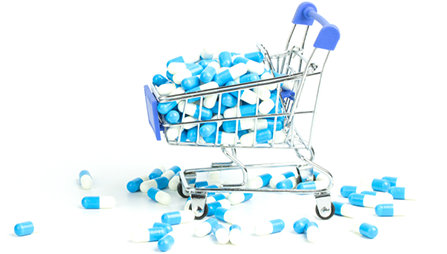Advertising Addiction
How Modern-Day Marketing Makes Good People into Addicts

The United States is a unique country in a lot of ways. We are the land of the free, the home of the brave. But there is one area in which we are quite trapped. In fact, there is an area in which only one other nation shares the same kind of entrapment as us. I am speaking of the insidious influence of pharmaceutical marketing over the American people. Of the almost 200 countries on this big blue planet of ours, only the United States and New Zealand allow pharmaceutical companies to advertise their products to consumers, i.e., the patients who would be taking these drugs.
We have to ask ourselves, why have all other nations vehemently opposed pharmaceutical drug marketing? And why has the U.S. been so willing to allow pharmaceutical giants to market their madness to the American people? And perhaps most importantly of all, why have we continued to allow such marketing to occur in light of the 21st-century addiction epidemic which began with pharmaceutical drugs?
The Power of Advertising
The field of advertising is an interesting one. If we’re being real and blunt, modern-day advertising—and it may have always been this way—is not directed at educating consumers about products and services so they can make an informed decision on which product or service to purchase. Instead, advertising uses emotional tactics and influencing techniques to cause consumers to make an emotion-based decision on which car to buy, what kind of toothpaste to use, and what type of drugs to take.

If you’ve watched a car ad lately or seen a pharmaceutical drug promoted on television, you know these segments are not intended to inform; they are designed to elicit an emotional, somewhat awe-struck response from the viewer. It’s the kind of response that will cause someone to make a purchase before they have thoroughly thought through their decision to do so.
Where Do Pharma Dollars Go?
A highly knowledgeable colleague of mine penned a research paper on not only the power of marketing in the pharmaceutical industry as pertains to the consumer (the patient) but also as relates to the provider (the doctor). Studying this material gave me insight as to why patients and doctors alike were so quick to jump on the bandwagon with the turn of the century push in pharmaceutical production, distribution, prescribing, and consumption.
Doctors and patients alike were directly marketed to, intensively.
In fact, doctors and consumers have been marketed to so much that pharma companies now spend more money on marketing and advertising than they spend on research and development for the drugs that they sell. The Washington Post has the full story on that heavy-hitter.
This is just so far out there it’s ridiculous. Amid an addiction crisis where some 19.7 million people are addicted—many of whom are either addicted to pharmaceuticals or who have self-medicated on these substances—pharma companies are allowed to spend more capital on promoting their products than they do on improving them.
Let’s look at a few analogies. Would you be happy with a roofer who spent more time trying to convince you that he was the right one to roof your house than he did actually roofing the house? Would you buy your organic produce from a farmer who spent more time bad-mouthing the other farmer’s produce than he did explaining his processes for growing high-quality vegetables and fruits? Would you take your pet to a veterinarian who spent more effort and energy explaining to you all of the degrees and certifications he had than he did actually examining your dog or cat?
The answer is a resounding “no” in all of the above examples. So why do we stand idly by while pharmaceutical companies invest more dollars into convincing us to use their products than they do into creating really great products in the first place?
Quality of a Product vs. Marketing of a Product
When we look at how often American patients fall prey to addiction to pharmaceutical drugs (mainly opioid pain relievers but there are other addictive pharma drugs), we see the reason why pharma companies have to spend more money on marketing. Their products are so lacking in quality and efficacy that pharma giants must market them intensely to influence people to buy them.
Let’s imagine for a moment a world where pharma manufacturers made medicines which addressed and resolved patient pain without causing severe addiction risk and other adverse side effects. The products would fly off the shelves. Pharma manufacturers would hardly even have to advertise them.
Year after year I have seen more and more people fall prey to addictions to pharmaceutical drugs that they were promised would help them. The look of surprise on addicts’ faces has gotten a little old. I can only imagine a world where pharma companies expend more effort on solving the problem than they do on marketing a “solution” which isn’t really a solution at all.
But then again, we may never see that day, as it is more profitable to treat a health issue than it is to cure it.
Direct to Consumer Marketing—Toxic to the American People

The most significant risk in pharmaceutical companies marketing their products to consumers and doctors alike (and why most countries do not allow this sort of thing to occur) is it will enable money-making corporations to influence the minds of medical professionals who must make decisions which dictate the overall health and quality of living of their patients.
A doctor’s mind is one which must be unclouded by advertising and sentimental influences to prescribe patients one drug over another. A patient’s mind should be clean and clear of advertising and promo. A patient should trust their doctor and not try to influence their doctor’s prescribing process because the patient “saw something on TV that looked great.”
Putting the risk of addiction aside (from patients taking drugs they don’t need after being influenced by a pharma ad), there are other harmful effects of pharma advertising. The Harvard Political Review sheds light on the fact that pharmaceutical companies which advertise their “primo, most-expensive products” heavily will bar consumers from becoming aware of more affordable medicines, hence potentially preventing consumers from accessing medications that are within their budget and which consumers might need.
The far-reaching dangers and risks in doctors and patients alike being influenced by pharmaceutical advertising are too relevant for us to allow this trend to go on. If we are emotionally affected into buying a car which might not have been a perfect fit for us, but we bought it because the advertising and the sales pitch for it were so overwhelming, it’s not the end of the world. But if we do this with potentially addictive medicines that we then put into our body, the results could be fatal.
In closing, an article in the LA Times heralds a concerning future in the sphere of pharmaceutical advertising. According to LA Times contributor David Lazarus, “The drug industry is now seeking official approval to expand its DTC (direct to consumer advertising) efforts by also promoting so-called off-label drug uses—that is, uses for which a drug wasn’t originally intended and for which it may not be fully tested.” The article goes on to say that the FDA is considering allowing pharma companies to make this change, a change which would expand pharma companies’ efforts in marketing to consumers—not reduce them.
If we don’t make our voices heard and speak up on this issue, the American people will continue to be sold on pharmaceutical drugs that we would not even consider taking otherwise. If we don’t speak out against pharmaceutical marketing, our doctors will continue to be influenced by pharmaceutical companies who rely on doctors to move their products. Has the addiction crisis of the 21st century—a crisis which started with and which continues with pharmaceutical drugs—taught us nothing? We have to put an end to this.
Sources:
- https://www.washingtonpost.com/news/wonk/big-pharmaceutical-companies-are-spending-far-more-on-marketing-than-research/
- http://harvardpolitics.com/is-direct-to-consumer-pharmaceutical-advertising-right-for-you/
- https://www.latimes.com/business/la-fi-lazarus-drugadvertising-story.html


 ®
®